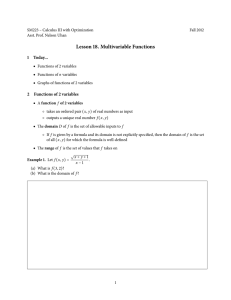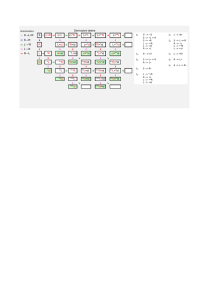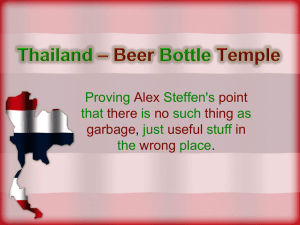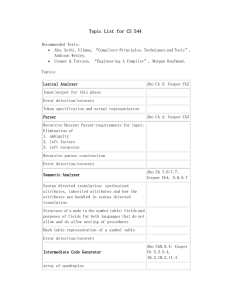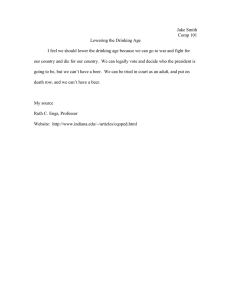Bell Labs Role in Programming Languages and Algorithms Al Aho
advertisement
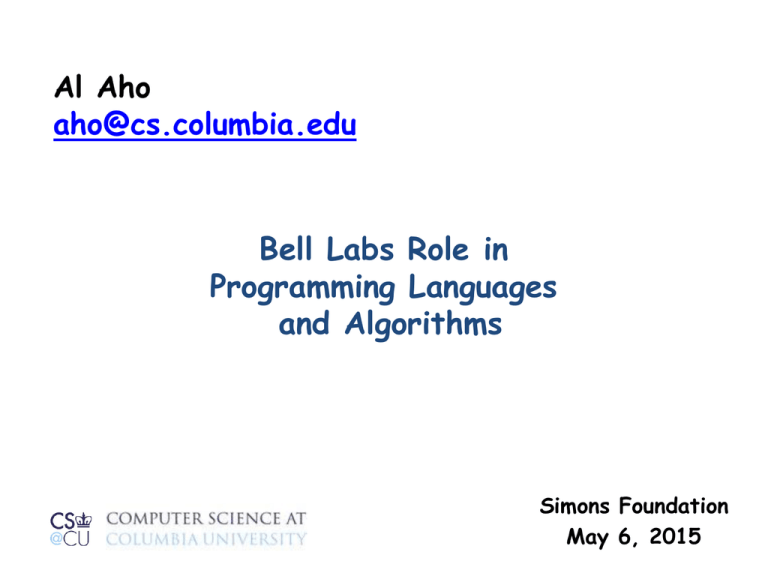
Al Aho
aho@cs.columbia.edu
Bell Labs Role in
Programming Languages
and Algorithms
Simons Foundation
May 6, 2015
What is an Algorithm?
A finite sequence of instructions, each of which has
a clear meaning and can be performed with a finite
amount of effort in a finite length of time.
Alfred V. Aho, John E. Hopcroft, and Jeffrey D. Ullman
Data Structures and Algorithms
Addison Wesley, 1983
Al Aho
3
Models of Computation
Underlying every algorithm is a model of computation
Important models of computation
Turing machines
The lambda calculus
Random access machines
Circuits with Boolean gates
Circuits with quantum gates
Al Aho
4
Landmark Algorithms from Bell Labs
Cooley-Tukey: Fast
Fourier Transform
(1965)
Peter Shor
Karmarkar: InteriorPoint Linear Programming
(1984)
Shor: Factoring Integers
on a Quantum Computer
(1994)
Shor’s Integer Factorization Algorithm
Problem: Given a composite n-bit integer, find
a nontrivial factor.
Best-known deterministic algorithm on a
classical computer has time complexity
exp(O( n1/3 log2/3 n )).
A quantum computer can solve this
problem in O( n3 ) operations.
Proc. 35th
Al Aho
Peter Shor
Algorithms for Quantum Computation: Discrete Logarithms and Factoring
Annual Symposium on Foundations of Computer Science, 1994, pp. 124-134
6
Integer Factorization: Estimated Times
Classical: number field sieve
– Time complexity: exp(O(n1/3 log2/3 n))
– Time for 512-bit number: 8400 MIPS years
– Time for 1024-bit number: 1.6 billion times longer
Quantum: Shor’s algorithm
– Time complexity: O(n3)
– Time for 512-bit number: 3.5 hours
– Time for 1024-bit number: 31 hours
(assuming a 1 GHz quantum device)
M. Oskin, F. Chong, I. Chuang
A Practical Architecture for Reliable Quantum Computers
IEEE Computer, 2002, pp. 79-87
Al Aho
7
Shor’s Quantum Factoring Algorithm
Input: A composite number N
Output: A nontrivial factor of N
if N is even then return 2;
if N = ab for integers a >= 1, b >= 2 then
return a;
x := rand(1,N-1);
if gcd(x,N) > 1 then return gcd(x,N);
r := order(x mod N); // only quantum step
if r is even and xr/2 != (-1) mod N then
{f1 := gcd(xr/2-1,N); f2 := gcd(xr/2+1,N)};
if f1 is a nontrivial factor then return f1;
else if f2 is a nontrivial factor then return f2;
else return fail;
Al Aho
Nielsen and Chuang, 2000
8
The Order-Finding Problem
Given positive integers x and N, x < N, such that
gcd(x, N) = 1, the order of x (mod N) is the
smallest integer r such that x r ≡ 1 (mod N).
E.g., the order of 5 (mod 21) is 6.
The order-finding problem is, given two relatively
prime integers x and N, to find the order of
x (mod N).
All known classical algorithms for order finding are
superpolynomial in the number of bits in N.
Al Aho
9
Quantum Order Finding
Order finding for an integer N can be done with a
quantum circuit containing
O((log N)2 log log (N) log log log (N))
elementary quantum gates.
Best known classical algorithm requires
exp(O((log N)1/3 (log log N)2/3 ))
time on a classical computer.
Al Aho
10
Some Other Notable Bell Labs Algorithms
Aho-Corasick: multiple keyword string matching
Foschini: V-BLAST MIMO signal detection
Garey, Graham, Johnson: approximation algorithms
Grover: quantum search
Hamming: error detecting and correcting codes
Johnson: shortest paths
Kernighan-Lin: graph partitioning heuristic
Kruskal: spanning tree
Lin-Kernighan: traveling salesman heuristic
Prim: spanning tree
Sethi-Ullman: optimal code generation
Thompson: regular expression matching
Al Aho
11
Bell Labs Wrote Many of the Early
Influential Books on Algorithms
Aho, Hopcroft and Ullman (1974)
Garey and Johnson (1979)
Techniques for designing efficient
algorithms
A guide to NP-complete
problems
What is a Programming Language?
A notation for describing algorithms to
computers and people
Al Aho
13
Programming Languages and Algorithms
Programming Languages + Algorithms =
Software
Al Aho
14
Credit: Intel Corporation
Software in Our World Today
How much software does the world use today?
Guesstimate: over one trillion lines of source code
What is the sunk cost of the legacy base?
$100 per line of finished, tested source code
How many bugs are there in the legacy base?
10 to 10,000 defects per million lines of source code
A. V. Aho
Software and the Future of Programming Languages
Science, February 27, 2004, pp. 1131-1133
Early Programming Languages
from Bell Labs
L1 and L2 (Bell 1 and Bell 2) for scientific
computation on the IBM 650 (V. Wolontis and D.
Leagus, 1956)
Macro extensions of compiler languages (M. D.
McIlroy and D. E. Eastwood, 1959)
SNOBOL string oriented symbolic language (D.
Farber, R. Griswold, and I. Polonsky, 1964)
L for list processing (K. C. Knowlton, 1966)
ALTRAN for computer algebra (W. Brown, 1968)
Al Aho
17
Landmark Programming Languages
from Bell Labs
C++ (1979-83)
Bjarne Stroustrup
C (1969-73)
Dennis Ritchie
“C is quirky, flawed,
and an enormous
success.”
“When I joined I was
basically told to ‘do
something
interesting’ … ”
S (1976-)
John Chambers
“We were concerned
to support serious
data analysis… ”
The Influence of UNIX
Fostered an explosion of
creativity with new tools,
languages, applications, and
derivative systems
• Internet servers
• Web browsers
• Linux
Unix (1969-71)
Ken Thompson and Dennis Ritchie
“… a system around which a fellowship
can form.”
“… the size constraint has encouraged
not only economy but a certain
elegance of design.”
• iOS
• Android
The Unexcelled Guidance of Doug McIlroy
Head of the Computing Techniques
Research Department at Bell Labs,
the birthplace of the Unix operating
system, 1965-1986
Pioneer of component-based software
engineering
Macros pioneer with D. E. Eastwood
Invented Unix pipes
Wrote Unix tools spell, diff, sort,
join, graph, speak, tr, etc.
“The real hero of programming
is the one who writes negative
code.”
M. Douglas McIlroy
A Research UNIX Reader:
Annotated Excerpts from the Programmer’s Manual
1971-1986
The Dragon Books Captured the Enormous
Synergy Between Theory and Compiler Design
1977
finite automata
grammars
lex & yacc
syntax-directed translation
1986
type checking
run-time organization
automatic code
generation
2007
garbage collection
optimization
parallelism
interprocedural analysis
Phases of a Compiler
source
program
Lexical
Analyzer
target
program
Syntax
Analyzer
token
stream
Semantic
Analyzer
syntax
tree
Interm.
Code
Gen.
annotated
syntax
tree
Code
Optimizer
interm.
rep.
Code
Gen.
interm.
rep.
Symbol Table
Alfred V. Aho, Monica S. Lam, Ravi Sethi and Jeffrey D. Ullman
Compilers: Principles, Techniques, & Tools
Addison Wesley, 2007
Front End Compiler Component Generators
source
program
lex
specification
yacc
specification
Lexical
Analyzer
Generator
LEX
Syntax
Analyzer
Generator
YACC
Lexical
Analyzer
token
stream
Michael E. Lesk and Eric Schmidt
Lex – A Lexical Analyzer Generator
CSTR 39, Bell Labs 1975
Syntax
Analyzer
syntax
tree
Stephen C. Johnson
Yacc-Yet Another Compiler Compiler
CSTR 32, Bell Labs, 1975
A Few Lex/Yacc-based Languages
ampl, mathematical programming (R. Fourer, D. Gay and B. Kernighan)
awk, for file-processing (A. Aho, P. Weinberger and B. Kernighan)
C++, an object-oriented extension of C (B. Stroustrup)
efl, extended Fortran language (S. Feldman)
eqn, for typesetting equations (B. Kernighan and L. Cherry)
f77, a Fortran 77 compiler (S. Feldman and P. Weinberger)
grap, for typesetting graphs (B. Kernighan and J. Bentley)
hoc, a C-like “desk-calculator” language (B. Kernighan and R. Pike)
ideal, for typesetting line drawings (C. Van Wyk)
make, for building software (S. Feldman)
pcc, a portable C compiler (S. Johnson)
pic, for typesetting line drawings (B. Kernighan)
ratfor, C-like syntax for Fortran (B. Kernighan)
struct, for converting Fortran to Ratfor (B. Baker)
Al Aho
24
Programming Languages Today
Today there are thousands of programming languages.
The website http://www.99-bottles-of-beer.net
has programs in over 1,500 different
programming languages and variations to
generate the lyrics to the song “99 Bottles
of Beer.”
“99 Bottles of Beer”
99 bottles of beer on the wall, 99 bottles of beer.
Take one down and pass it around, 98 bottles of beer on the
wall.
98 bottles of beer on the wall, 98 bottles of beer.
Take one down and pass it around, 97 bottles of beer on the
wall.
.
.
.
2 bottles of beer on the wall, 2 bottles of beer.
Take one down and pass it around, 1 bottle of beer on the wall.
1 bottle of beer on the wall, 1 bottle of beer.
Take one down and pass it around, no more bottles of beer on
the wall.
No more bottles of beer on the wall, no more bottles of beer.
Go to the store and buy some more, 99 bottles of beer on the
wall.
[Traditional]
“99 Bottles of Beer” in C++
#include <iostream>
using namespace std;
int main()
{
int bottles = 99;
while ( bottles > 0 )
{
cout << bottles << " bottle(s) of beer on the wall," << endl;
cout << bottles << " bottle(s) of beer." << endl;
cout << "Take one down, pass it around," << endl;
cout << --bottles << " bottle(s) of beer on the wall." << endl;
}
return 0;
}
[Tim Robinson, http://www.99-bottles-of-beer.net/language-c++-109.html]
The Birth of AWK
• AWK is a scripting language for routine dataprocessing tasks designed by Al Aho, Brian
Kernighan, Peter Weinberger at Bell Labs around
1977
• Each of the co-designers had slightly different
motivations
– Aho wanted a generalized grep
– Kernighan wanted a programmable editor
– Weinberger wanted a database query tool
• All co-designers wanted a simple, easy-to-use
language
Structure of an AWK Program
• An AWK program is a sequence of pattern-action statements
pattern { action }
pattern { action }
. . .
• Each pattern is a boolean combination of regular, numeric,
and string expressions
• An action is a C-like program
If there is no { action }, the default is to print the line
• Invocation
awk ‘program’ [file1 file2 . . . ]
awk –f progfile [file1 file2 . . . ]
AWK’s Model of Computation:
Pattern-Action Programming
for each file
for each line of the current file
for each pattern in the AWK program
if the pattern matches the input line then
execute the associated action
Some Useful AWK “One-liners”
1. Print the total number of input lines
END { print NR }
2. Print the last field of every input line
{ print $NF }
3. Print each input line preceded by its line number
{ print NR, $0 }
4. Print all non-empty input lines
NF > 0
5. Print all unique input lines
!x[$0]++
Comparison: Regular Expression Pattern Matching
in Perl, Python, Ruby vs. AWK
Time to check whether a?nan matches an
regular expression and text size n
Russ Cox, Regular expression matching can be simple and fast (but is slow in Java, Perl,
PHP, Python, Ruby, ...) [http://swtch.com/~rsc/regexp/regexp1.html, 2007]
“99 Bottles of Beer” in AWK (bottled version)
BEGIN{
split( \
"no mo"\
"rexxN"\
"o mor"\
"exsxx"\
"Take "\
"one dow"\
"n and pas"\
"s it around"\
", xGo to the "\
"store and buy s"\
"ome more, x bot"\
"tlex of beerx o"\
"n the wall" , s,\
"x"); for( i=99 ;\
i>=0; i--){ s[0]=\
s[2] = i ; print \
s[2 + !(i) ] s[8]\
s[4+ !(i-1)] s[9]\
s[10]", " s[!(i)]\
s[8] s[4+ !(i-1)]\
s[9]".";i?s[0]--:\
s[0] = 99; print \
s[6+!i]s[!(s[0])]\
s[8] s[4 +!(i-2)]\
s[9]s[10] ".\n";}}
[Wilhem Weske, http://www.99-bottles-of-beer.net/language-awk-1910.html
“99 Bottles of Beer” in the Whitespace language
[Andrew Kemp, http://compsoc.dur.ac.uk/whitespace/]
Conlangs: Made-Up Languages
Okrent lists 500 invented languages including:
• Lingua Ignota [Hildegaard of Bingen, c. 1150]
• Esperanto [L. Zamenhof, 1887]
• Klingon [M. Okrand, 1984]
Huq Us'pty G'm (I love you)
• Proto-Central Mountain [J. Burke, 2007]
• Dritok [D. Boozer, 2007]
Language of the Drushek, long-tailed beings with
large ears and no vocal cords
[Arika Okrent, In the Land of Invented Languages, 2009]
[http://www.inthelandofinventedlanguages.com]
Why Are There So Many Languages?
• One language cannot serve all application areas well
– e.g., programming web pages (JavaScript)
– e.g., electronic design automation (VHDL)
– e.g., parser generation (YACC)
• Programmers often have strongly held opinions
about
– what makes a good language
– how programming should be done
• There is no universally accepted metric for a good
language!
Evolutionary Forces on Languages
Increasing diversity of applications
Stress on increasing programmer productivity
and shortening time to market
Need to improve software security, reliability
and maintainability
Emphasis on mobility and distribution
Support for parallelism and concurrency
New mechanisms for modularity
Trend toward multi-paradigm programming
Evolution of Programming Languages
1970
Fortran
Lisp
Cobol
Algol 60
APL
Snobol 4
Simula 67
Basic
PL/1
Pascal
2015
Java
C
C++
Objective-C
C#
JavaScript
PHP
Python
Visual Basic
Visual Basic .NET
TIOBE Index
April 2015
Towards More Reliable Software
How can we get reliable software
from unreliable programmers?
Al Aho
39
The Spin Software Verification Tool
• Developed by Gerard Holzmann at
Bell Labs starting in 1980
• Tool has been used worldwide for
the formal verification of multithreaded software applications
• Available as an open-source
software verification tool
• Used to help verify the software
in NASA’s Mars Curiosity Rover
Al Aho
40
Mission to
Mars…
5 August 2012
Mars
Earth
Sun
Mercury
Venus
26 November 2011
a trip of
350 Million miles
41
Destination: Gale Crater
an old streambed
12 x 4.3 mile landing ellipse
Gerard Holzmann
42
How Do You Make Sure That It Works?
43
And What About the Software?
3 million lines of C code
120 parallel threads
VxWorks tasks
2 CPUs (1 spare)
5 years development time, with
a team of 40 software engineers
< 10 lines of code per hour
1 customer, 1 use:
it has to work the first time
How do you get it right?
Gerard Holzmann
44
Getting it right
some of the things done differently
from previous missions
1. Defined a new risk-based Coding Standard
with tool-based compliance checks
2. Introduced a Certification program for
flight software developers
3. Introduced routine use of strong Static
Source Code Analysis tools
4. Defined a new Code Review process and
Tool (scrub), integrated with static analysis
5. Made use of formal analysis for key
subsystems with Logic Model Checking
Gerard Holzmann
45
Verifying Concurrent Code
What is the State-of-the-art?
a small
example
2000
2004
2006
2000: manual proof (a few months)
proof sketch: 5 pages, 7 Lemmas, 5 Theorems
2004: new proof with PVS theorem prover (3 months)
2006: +CAL model & TLA+ proof (a few days)
Is it any easier today?
Gerard Holzmann
46
Logic Verification
$ verify dcas.c
..report assertion violation
$
1. this takes C code as input
it uses the modex model-extractor to generate
a formal model mechanically, and then runs the
Spin model-checker to check if the assertion
can be violated
2. all steps together take about 10 seconds
3. the verification step itself takes a fraction of that
Gerard Holzmann
47
Cutting to the Chase
In the first (Earth) year on the surface of Mars the
previous mission lost 26 days of operation to software bugs.
In the first year on Mars the MSL mission lost 1 day to a
single bug.
Gerard Holzmann
48
Credit: Intel Corporation
Parting Questions
How much of human behavior can we impact
with software?
Al Aho
50
Final Parting Question
How much of human behavior can we simulate
with software?
Al Aho
51
